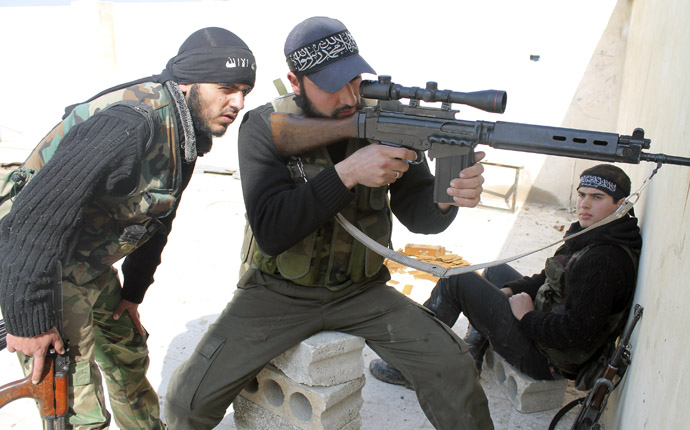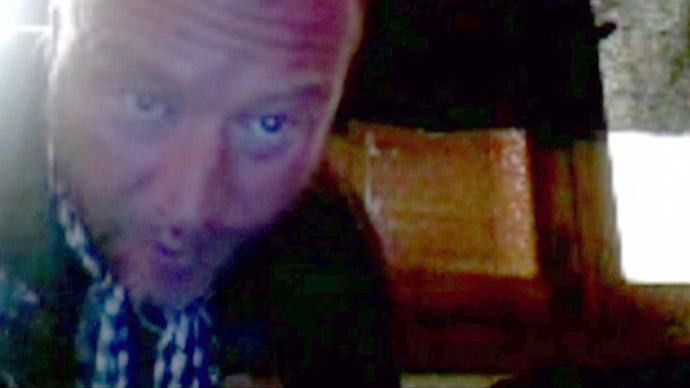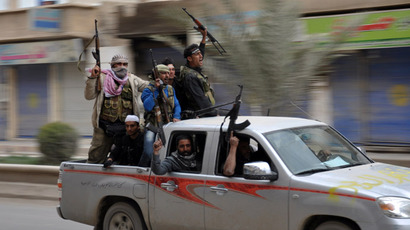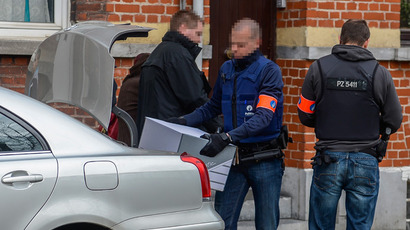‘He was brainwashed’: Desperate Belgian father searches for son fighting in Syria
As EU security officials become increasingly concerned about the growing number of young Europeans fighting in Syria, a desperate Belgian father went to look for his 18-year-old son in the ancient Syrian city of Aleppo.
“I haven’t had a contact with Jejoen, but we assume he’s here
in Aleppo," Dmitri Bontinck told Deredactie.be via Skype.
"Planes are flying overhead all the time. When we are on the
street or inside a building, we hope a bomb won’t drop on
us.”
Dimitri, who hails from the northern Belgian city of Antwerp, had
to return to Turkey after he failed to track down his son Jejoen in
Syria, Flanders Today reported.

Using publicly available data, the International Centre for the
Study of Radicalization (ICRS) estimated that up to 5,500 foreign
fighters have traveled to Syria since the beginning of the
uprising, about 10 percent of whom came from Europe.
About 500 Europeans – mostly from the UK, Ireland and France – are
now fighting against Bashar Assad's regime alongside the rebels in
Syria, the EU's anti-terror chief told the BBC earlier this
week. According to the EU Terrorism Situation and Trend
Report, Syria has seen a rise in the number of EU citizens
traveling to the country as jihadists to “fight alongside groups
associated with religiously inspired terrorism."
The report showed that Syria was the “destination of choice for foreign fighters in 2012," highlighting the risk of EU citizens using their new training and knowledge to commit acts of terrorism in Europe after they return.
“What we often see is that these people have at a certain
point been in contact with a radical extremist group which has
attracted them and afterwards they’ve started to become more
radicalized,” Michele Cercone, spokesman for the EU Home
Affairs Commissioner, told RT.

Dimitri Bontinck has struggled to track down his son by himself,
receiving no help from Belgian authorities: “We don't expect
that Belgium will send an army to Syria, I think that's clear. So
that's also why Dimitri Bontinck was eager to go himself, he said I
want to do something for my son,” Dmitri’s lawyer Kris Luyckx
told RT.
Those who knew Jejoen recalled that he began to change about three
years ago, influenced by the radicals he met in his native
Belgium.
“He made contact with some people on the street and there was
also a story about an untold love, he had a girlfriend, it didn't
work out, and there were some friends who said, okay come with us
and very slowly, it started that he was really influenced and
really brainwashed – those are the words of my client,” Luyckx
explained.

Jejoen grew a beard, started wearing “different” clothes, and
got into the habit of praying five times a day. “It was a little
bit awkward for a son of 15, 16 years old, so he was really under
the influence of radical people,” Luyckx added.
In mid-April, Belgian police stormed 46 homes in Antwerp and
arrested Foaud Belkacem, the leader of the radical Islamist group
Shariah4Belgium. The Salafist group is known for opposing Syrian
President Assad. Belkacem was taken to prison for hate speech and
calls justifying the use of violence. He has been charged
with terrorism, and could face up to 20 years in jail.
Terrorism expert Claude Moniquet told RT that the rising numbers of
radicalized youth is alarming, and that many of them are
impressionable to radicalism: “The first question is, why they
convert. Usually they don't convert to make jihad. They convert
because they have a problem at one moment in their life and they
try to escape this difficulty. Most of them have no clear political
ideas, they go to fight because they fight. And their goal is to
fight.”
National security organizations have recently increased their
efforts to track how young people are being recruited, amid
concerns that some of those currently in Syria could join Islamists
groups linked to Al-Qaeda and launch terror attacks when they
return to Europe.
“If they don't meet a Muslim who convinces them, they could be
in a sect,” Moniquet said. “They are trapped in the net of
people who are there just recruiting them and for convincing them
that to be a good Muslim they want to go to Syria or to commit
another terrorist attack here.”
The fighting in Syria continues to intensify as Syrian government
troops battle opposition forces in the districts surrounding the
capital Damascus. The civil conflict has lasted for over two years,
claimed more than 70,000 lives and displaced almost 4 million
people, according to the UN.














